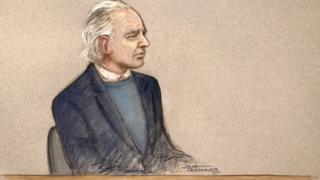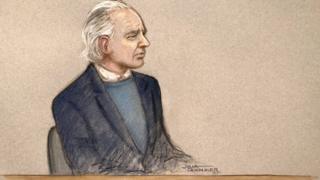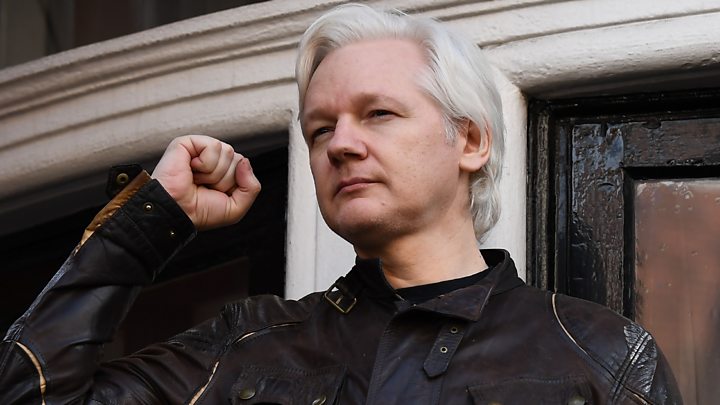Julian Assange: Judge refuses to delay extradition hearing
The Wikileaks co-founder is fighting extradition to the US over claims he leaked government secrets. …


A judge in London has rejected Julian Assange’s attempt to delay his US extradition case.
The United States wants to try the Wikileaks co-founder over allegations of leaking government secrets.
His lawyers had asked for more time “to gather evidence” but District Judge Vanessa Baraitser refused and said a full hearing will begin in February.
Assange, 48, mumbled and paused as he gave his own name and date of birth in court.
Asked by the judge for his personal details, frail-looking Assange stuttered – apparently finding it hard to remember when he was born, according to the BBC’s Richard Galpin in court.
When his case at Westminster Magistrates’ Court was adjourned, the Australian complained that he had not understood proceedings, and said: “This is not equitable.”
Assange added: “I can’t research anything, I can’t access any of my writing. It’s very difficult where I am.”
He told the judge he is up against a “superpower” with “unlimited resources” and that he “can’t think properly”.

Media playback is unsupported on your device
Assange was jailed for 50 weeks in May for breaching his bail conditions after going into hiding in the Ecuadorian Embassy in London for nearly seven years in order to avoid extradition to Sweden over sex offence allegations – which he has denied.
He was due to be released from Belmarsh prison in London last month, but a judge remanded him in custody because there were “substantial grounds” for believing he would abscond.
In court on Monday, Assange went on to complain about conditions in the high-security prison where he is being held in a medical ward.
‘Legally unprecedented’
Asking for a three-month delay to proceedings, Assange’s barrister, Mark Summers QC, told the court there was a “direct link” between the “reinvigoration” of the investigation and US President Donald Trump’s administration.
“Our case will be that this is a political attempt to signal to journalists the consequences of publishing information,” he said. “It is legally unprecedented.”
Mr Summers also claimed the US was involved in invading his client’s legal privilege.
“The American state has been actively engaged in intruding into privileged discussions between Mr Assange and his lawyers in the embassy, also unlawful copying of their telephones and computers (and) hooded men breaking into offices,” he said.
However, District Judge Baraitser refused the request to delay the extradition hearing.
She said Assange’s next case management hearing will take place on 19 December before the full extradition hearing begins next year.
On Twitter, Assange’s mother Christine offered her “deepest gratitude” to the dozens of protesters who appeared outside the courthouse.
Ex-CIA contractor turned whistle-blower Edward Snowden also quoted comments made by Assange’s legal team, saying the judge had dismissed their request for more time “despite new evidence”.
Former Mayor of London Ken Livingstone and journalist John Pilger were among Assange’s supporters in the public gallery.
Last week, Assange’s legal team said the extradition case was an “outrageous assault on journalism”.




